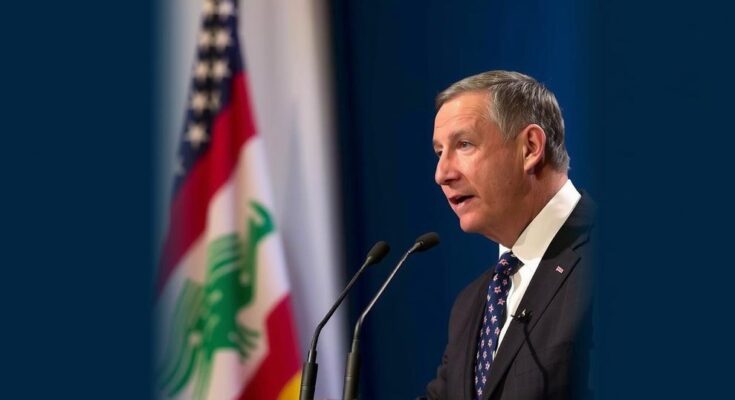U.S. Ambassador to Lebanon, Lisa Johnson, is promoting an internal uprising against Hezbollah, calling for Lebanese citizens to act against the group during ongoing Israeli conflicts. Johnson advocates the election of Lebanese Armed Forces Commander Joseph Aoun as president and encourages sectarian tension to weaken Hezbollah’s influence both politically and militarily. This strategy is set against a backdrop of Lebanon’s multifaceted society and historical civil conflict, highlighting the risks of external interference.
Recent reports indicate that Lisa Johnson, the U.S. Ambassador to Lebanon, is pursuing strategies aimed at fostering a significant internal uprising against Hezbollah amidst ongoing regional conflicts. In conversations with various Lebanese political figures, Ambassador Johnson proposed that the Lebanese populace should actively engage in efforts to dismantle Hezbollah’s influence and return to political dynamics reminiscent of the period following the assassination of Rafik Hariri. Ambassador Johnson articulated a viewpoint that the current geopolitical climate presents favorable conditions for a coordinated Lebanese response against Hezbollah. She expressed a sense of urgency, urging politicians to overcome their fears, asserting that Hezbollah has been weakened and that “we are with you, and the entire free world stands by your side.” Moreover, Johnson advocated for the potential election of Joseph Aoun, the Commander of the Lebanese Armed Forces, as the next President of Lebanon, highlighting his ability to appoint a capable leader to further constrain Hezbollah’s support. Additionally, she has been encouraging local political allies to initiate incitement operations that may exacerbate sectarian tensions, particularly in areas affected by the displacement of Shia populations due to Israeli military actions. The historical context is critical, as Lebanon’s society is inherently multi-faith and multi-ethnic, harboring vulnerabilities that make it susceptible to external influences. The Lebanese Civil War (1975-1990) remains a stark reminder of these divisions, which resulted in immense human and social costs. In her remarks, Johnson underscored a comprehensive approach not only to systematically weaken Hezbollah’s military presence but also its political alliances, indicating a broader intention to undermine Iranian regional influence.
The current political landscape in Lebanon is significantly influenced by the historical ramifications of its Civil War and the ongoing tensions with Israel. Hezbollah, a Shia Islamist political party and militant group, plays a critical role in Lebanese society and politics. The presence of displaced populations adds complexity to the socio-political fabric, making Lebanon vulnerable to both sectarian strife and external manipulation. The U.S. has historically maintained an interest in countering Hezbollah’s influence in the region, particularly amid ongoing Israeli-Palestinian conflicts and broader Iranian regional aspirations.
In summary, Ambassador Lisa Johnson’s recent actions and statements reflect a concerted effort by the U.S. to facilitate an internal uprising against Hezbollah in Lebanon. Her focus on empowering local political figures, fostering sectarian divisions, and promoting alternative leadership under General Joseph Aoun underscores the multifaceted approach the U.S. is pursuing to achieve its geopolitical objectives in the region. This situation is indicative of the volatile intersection of local and international forces at play in Lebanon today.
Original Source: mronline.org




